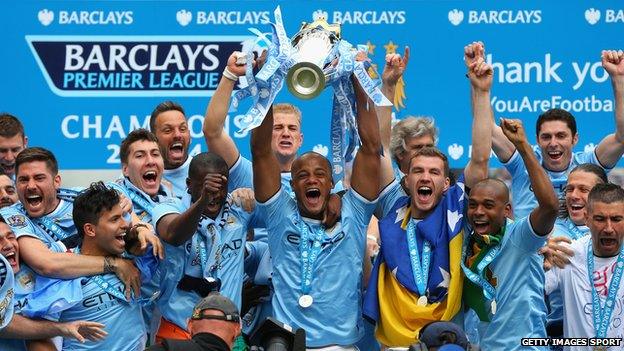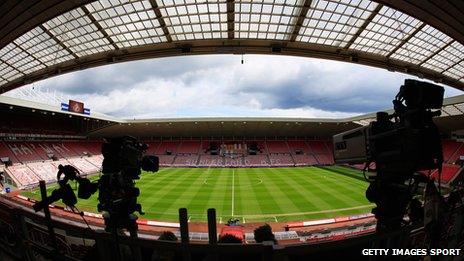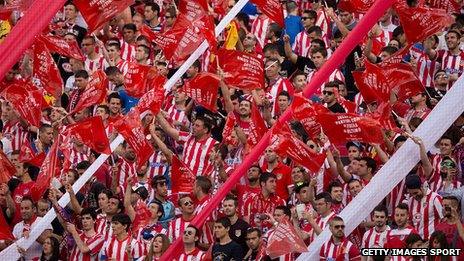Exporting football. Why does the world love the English Premier League?
- Published

Premier League champions Manchester City are expected to earn about £100m in TV money this season
Has England given football to the world? A more accurate description today is that England sells football to the world.
The final round of matches in the English Premier League (EPL) was watched across the globe. In fact, the majority of the TV audience that saw Manchester City crowned as champions was outside of England.
In 2008 the EPL proposed Game 39. This was an international round of fixtures between EPL teams to be played on the same weekend in venues around the world. It was thought that up to £80m ($135m) might be made each year.
But Game 39 never happened. Fans in England were not keen on the idea and football's world governing body FIFA were none too pleased. However, this has not stopped English teams from cashing in on the popularity of the competition overseas.
Pre-season friendly games have turned into international tours. North America and Southeast Asia are the most popular destinations. Arsenal, Tottenham, Chelsea, Liverpool and both Manchester clubs went jet-setting before the season kicked off.
Every two years, the Premier League Asian Trophy is contested between three EPL teams and a representative from Asia.
There is now even the post-season tour. Just days after lifting the trophy Manchester City will be off to UAE.
However, TV is where the popularity of the EPL is really transferred to money earned. The new deal which runs from 2013-16 is worth nearly £5.5bn.
Over £2bn of this comes from the sale of overseas rights. Thailand, Singapore, Hong Kong and Malaysia paid £650m between them.
This season 98% of all Premier League matches were available to TV viewers outside of England. North Korea and Albania are the only two countries not to have some form of rights agreement in place.
Spain's La Liga, Italy's Serie A and Germany's Bundesliga do not come close to the ability of the EPL to generate TV cash outside of Europe. This is despite Spain's well-known teams and players.
Why is the EPL so popular?

Football matches are staggered to maximise both the UK and global TV audiences
As for many British businesses, the time zone, language and first mover advantage help.
Games that traditionally kick off at 3pm in England will be broadcast at 10pm or 11pm in Southeast Asia.
Although the traditionalists may not like it, weekend matches are staggered to maximise both the UK and global TV audiences.
In America, the EPL rights were recently taken over by NBC which has massively increased the number of homes in which football, sorry I should say soccer, can be watched.
Audiences have increased significantly because the early morning kick off times don't conflict with the schedules of baseball, basketball, etc.
In Spain, games traditionally kick off at 8pm which would air at about 3am in Asia. It is only in the last few years that some games have been brought forward with Asian viewers in mind.
The English language is of course a natural advantage. Bayern Munich may be the current European Champions, but the appeal of the Bundesliga overseas is hampered by limited understanding of German.
English football was also the first European football to be broadcast in many countries. The BBC and ITV had been showing top flight English football around the world even before the Premier League was formed over 20 years ago.
It is also no coincidence that English football is popular in Commonwealth countries and where you find concentrations of English expats.
The nature of the competition
EPL chief Richard Scudamore attributes the global appeal to the intrinsic value of the product.
In England football is described as fast and fanatic and played in atmospheric stadiums often full to capacity. The games are also viewed as more competitive than in rival leagues.
This is partly because TV money in the EPL is distributed more equally.
The champions Manchester City are expected to pick up around £100m in TV money this season. The bottom club Cardiff will have to make do with about £60m.
In Spain, where clubs negotiate individual TV deals, Barcelona and Real Madrid will rake in more than the EPL Champions, an estimated 150m euros each. This is four times more than the third highest deal and more than 10 times what half the teams in the division will receive.

Atletico Madrid are gunning for the La Liga title
This season Atletico Madrid have surprised everybody in challenging for the La Liga title, but their better players and manager have already been linked with moves away to more affluent clubs which would naturally restore the hegemony of the big two.
Overseas TV money is currently distributed equally among the EPL's 20 clubs giving each about £32m per season. The bigger clubs would stand to gain if they were allowed to negotiate individual deals for overseas TV rights.
When Fenway Sports Group, who also own the Boston Red Sox baseball team, took over Liverpool Football Club in 2009 they argued for such a change but garnered little support from the rest of the league.
Even the owners of Manchester United, who would have the most to gain, favoured the collective agreement as it strengthens the competition and makes the league more interesting.
So whether it is exciting football, savvy marketing, good organisation or traditional advantages the EPL has found a way of selling its product to the rest of the world.
And when lots of people are interested in something it opens up lucrative merchandising opportunities and sponsorship deals as well.
When you bear in mind the EPL is only beginning to breakthrough into China and India, English football could soon be more valuable to the rest of the world than it is to the English, if it isn't already.